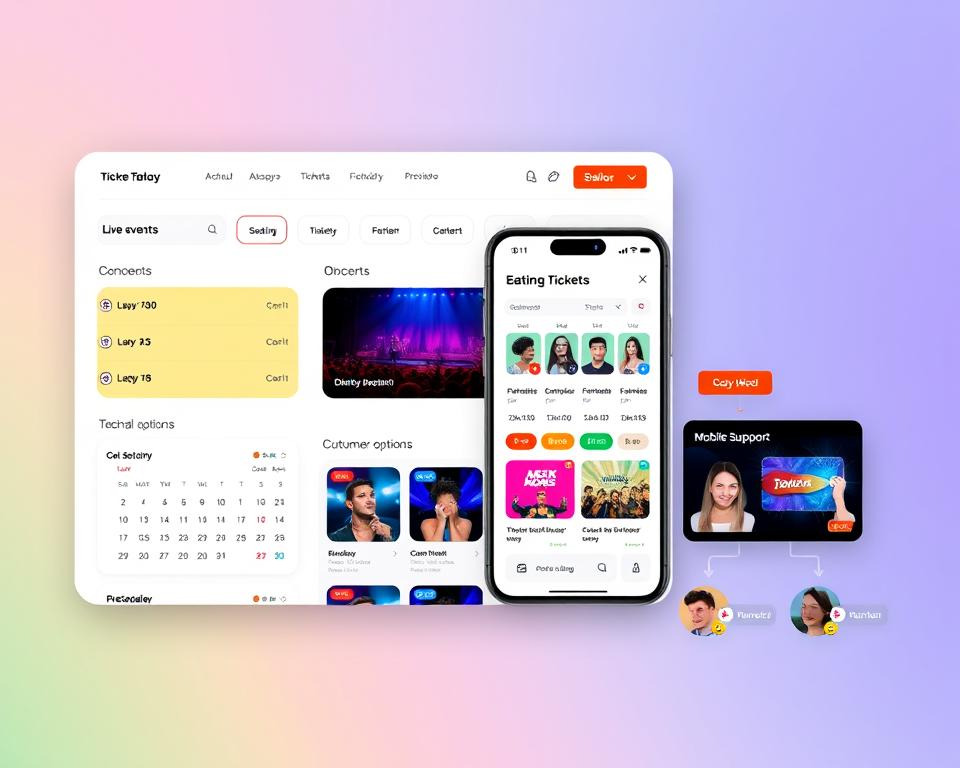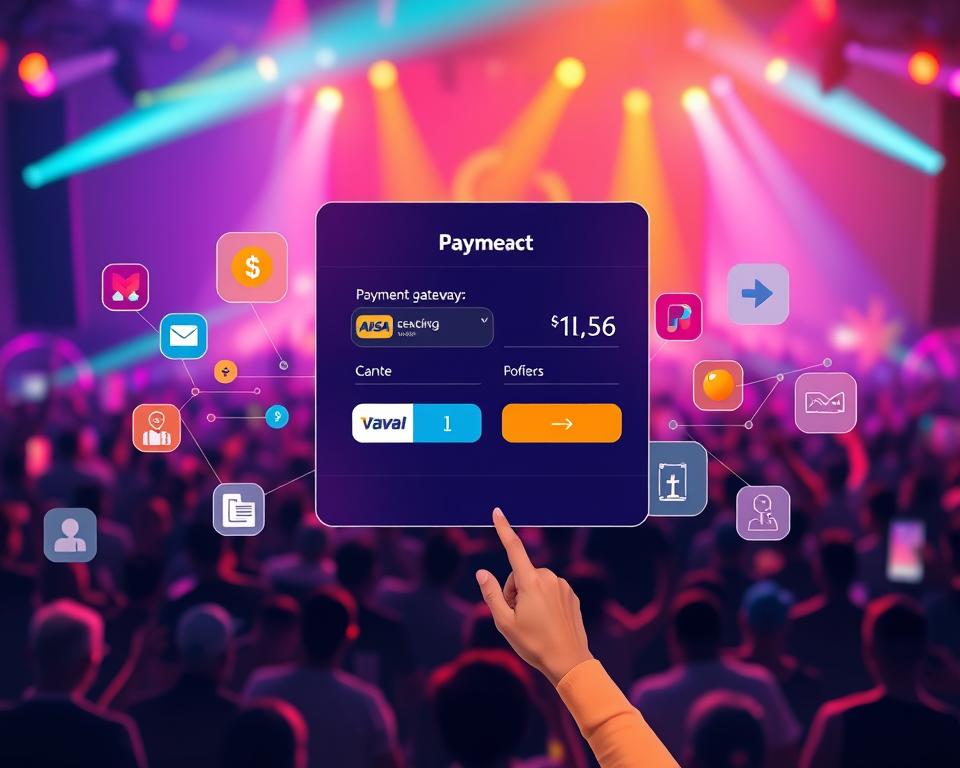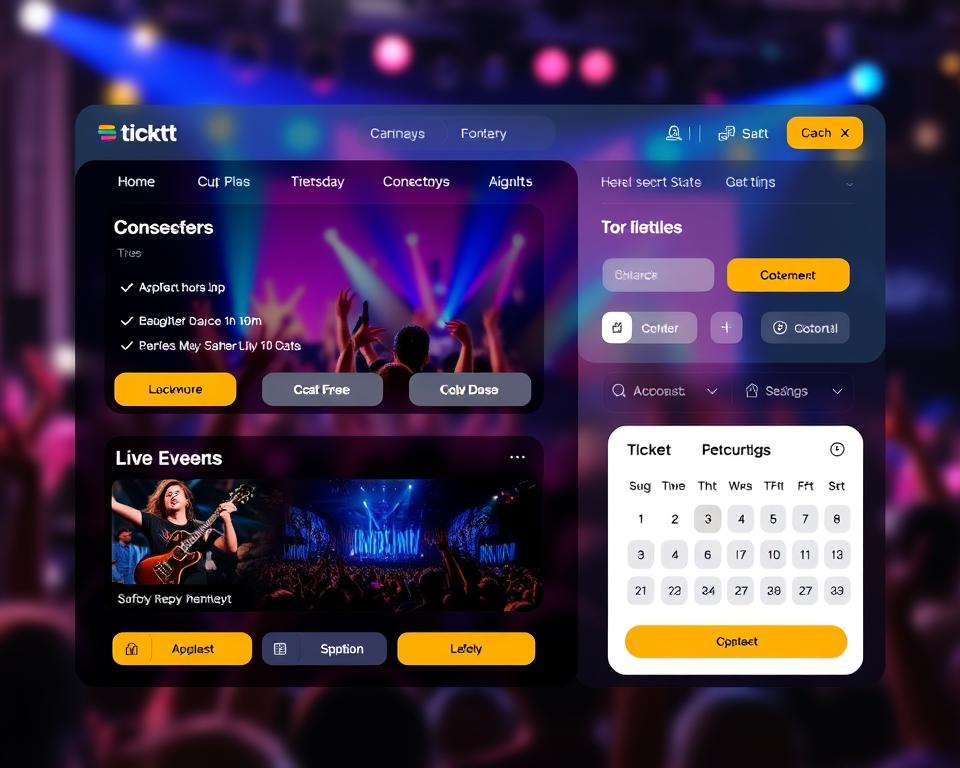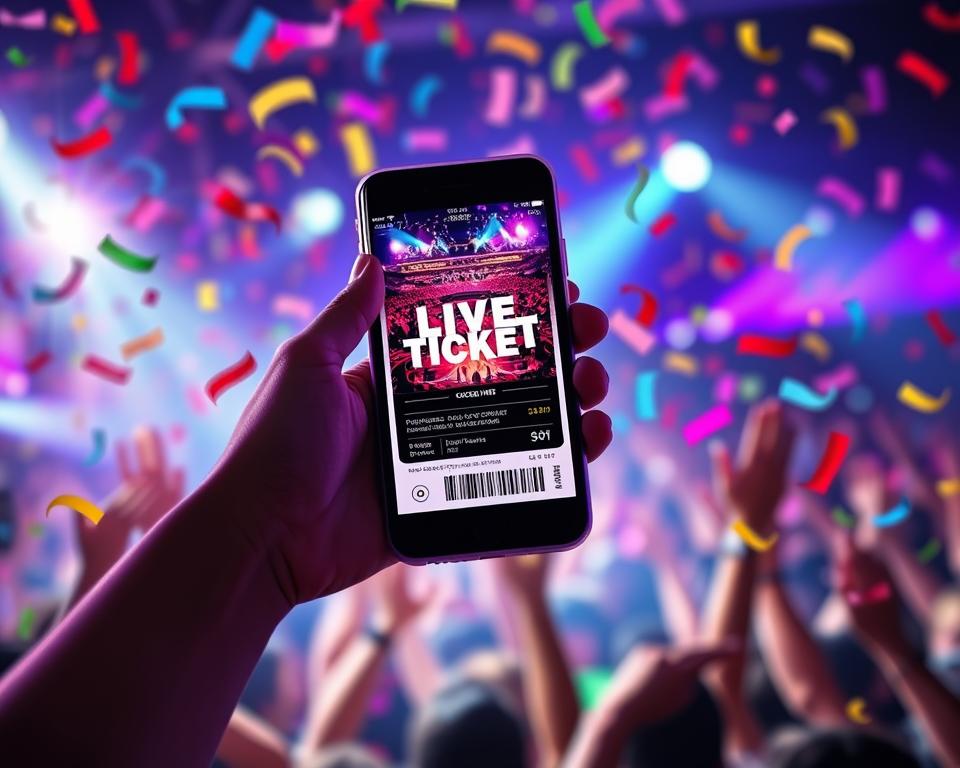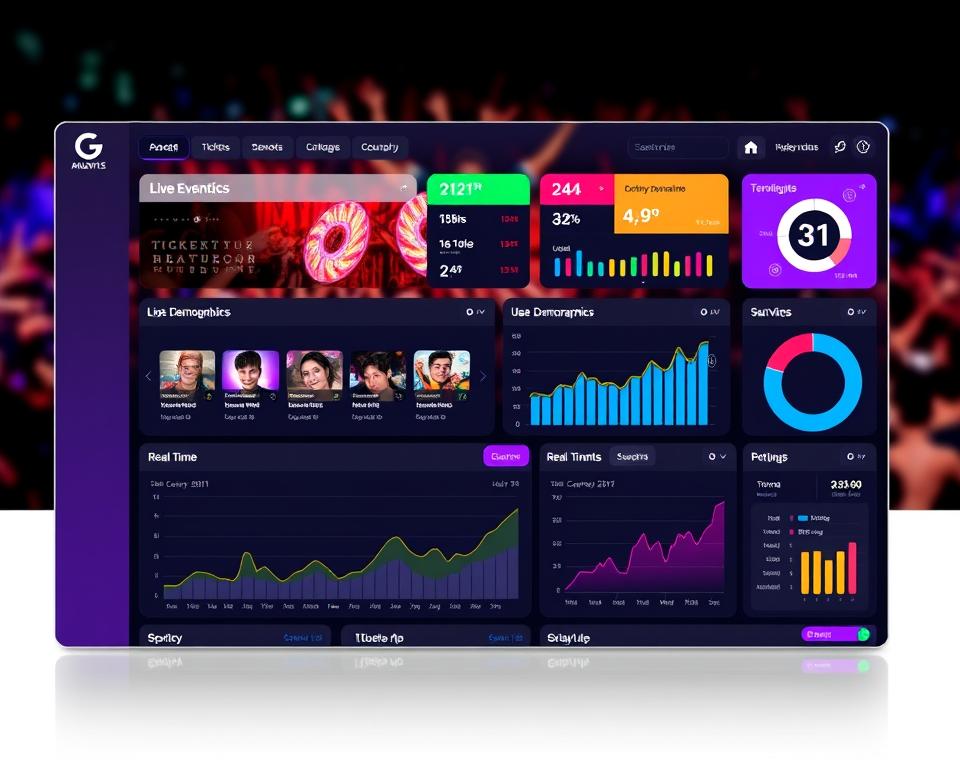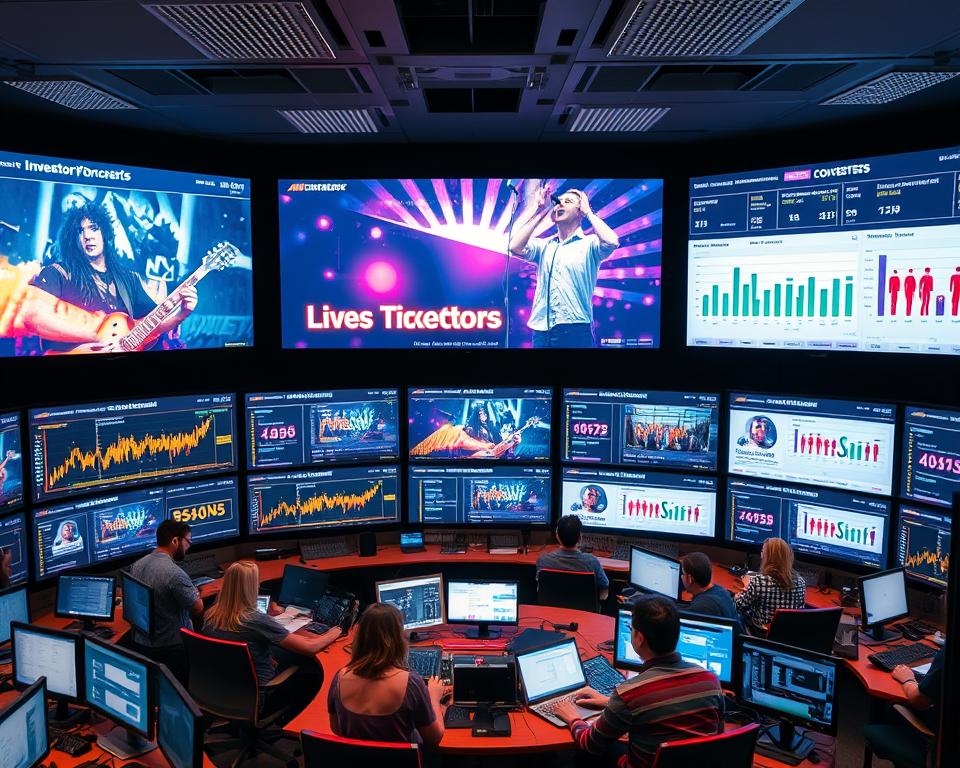The world of entertainment is always changing, and ticket booking is more important than ever. Live events and concerts are evolving, and businesses need strong digital ticketing solutions. These solutions must meet the needs of today’s consumers.
Online ticketing has changed how we buy and manage event tickets. Ticket booking platforms are key to the entertainment industry. They help event organizers reach more people, make ticketing easier, and improve customer happiness.
This guide will cover the basics of creating successful ticket booking platforms. We’ll look at the event ticketing industry, including its size, players, and trends. We’ll also talk about important features and security measures. You’ll learn how to build a competitive and easy-to-use digital ticketing solution.
Table of Contents
Key Takeaways
- The live events and concert industry is undergoing a digital transformation, with the demand for seamless online ticketing platforms on the rise.
- Developing a robust ticket booking platform can help event organizers reach a wider audience, streamline the ticketing process, and enhance customer experience.
- Understanding the event ticketing industry landscape, including market size, key players, and industry trends, is crucial for building a successful platform.
- Implementing essential features, such as secure payment processing, real-time inventory management, and mobile-friendly design, is critical for delivering a modern and user-friendly ticketing experience.
- Ensuring scalability, performance optimization, and compliance with industry regulations are essential for the long-term success of the ticket booking platform.
Understanding the Event Ticketing Industry Landscape
The event ticketing industry has grown a lot in recent years. This growth comes from more people wanting to go to live events and the shift to digital ticketing. Looking closely at the market shows us where the industry is now and who’s leading it into the future.
Current Market Size and Growth Projections
The global event ticketing market is set to hit $68 billion by 2025. It’s growing at over 6% each year from 2020 to 2025. This big increase is due to more people wanting to see live shows, the rise of mobile tickets, and new tech in the field.
Key Players and Competitors Analysis
A few big names lead the event ticketing world: Ticketmaster, StubHub, and Eventbrite. They offer many services to event planners and fans. But, new, smaller platforms are also popping up. They focus on specific groups and offer different ticketing experiences.
Industry Trends and Innovations
- Mobile ticketing and contactless entry are becoming more common. They make going to events easier and more convenient.
- Blockchain technology is being used in ticketing. It makes transactions safe and fair, and helps stop ticket scalping.
- Dynamic pricing is getting more attention. It lets event organizers change ticket prices based on demand and market conditions.
- There’s a big push for data-driven insights. These insights help plan and market events better, and improve how events engage with their audience.
As the event ticketing industry keeps changing, these trends and new ideas are shaping its future. They meet the changing needs of event planners and fans.
Essential Features for Modern Ticket Booking Platforms
To stand out in today’s digital world, a ticketing platform must focus on user experience. It needs to offer easy seat selection, secure e-ticket delivery, and simple search and filtering. These features make a platform more appealing to event-goers.
An interactive seating chart is key for a user-friendly ticketing platform. It lets customers pick their seats, making the booking process smoother. This personal touch sets a platform apart from others.
A modern ticketing platform also needs to handle transactions well and deliver e-tickets securely. Reliable payment systems and safe customer data are crucial. They build trust and confidence.
Platforms should also have advanced search and filtering tools. These help customers find events quickly and easily. This makes the booking process better and more enjoyable.
By adding these key features, ticketing platform providers can offer a unique and user-focused experience. This helps them stand out in the competitive event ticketing market.
| Feature | Benefit |
|---|---|
| Interactive Seating Charts | Enhances the booking process and provides a personalized experience for customers |
| Secure Payment Processing and E-Ticket Delivery | Builds trust and confidence with users by ensuring the safety of their data and transactions |
| Advanced Search and Filtering Options | Improves user experience by enabling customers to easily find and select the events they want to attend |
“Delivering a seamless and engaging booking experience is paramount in the competitive event ticketing industry.”
Building Ticket Booking Platforms for Live Events and Concerts
Creating a ticketing platform for live events and concerts needs careful planning. You must choose the right software architecture and technology stack. This part talks about the important steps to make a strong and growing ticketing solution.
Platform Architecture Overview
A good ticketing platform starts with a solid software architecture. It should have a modular design. This means breaking down the platform into parts like event management and ticket sales.
This design makes it easier to update, grow, and connect with other services.
Technology Stack Selection
Choosing the right technology stack is key in ticketing platform development. Many go for the MEAN or LAMP stack. These stacks are known for being reliable and secure for building ticket apps.
Development Timeline Planning
Planning the project timeline is crucial for a ticketing platform’s success. You need to outline the development stages. This includes designing the software architecture and implementing the tech stack.
Then comes feature development, testing, and deployment. A detailed plan helps teams meet deadlines and provide a smooth user experience.
“Building a successful ticketing platform requires a strategic approach to software architecture, technology selection, and project planning.”
Security Measures and Fraud Prevention Systems
Online ticket booking for live events and concerts needs strong security. Ticket platforms must focus on ticketing security and fraud prevention. This protects both customers and event organizers.
Secure transactions are key. They use encryption like Secure Socket Layer (SSL) certificates. These SSL certificates make a safe, encrypted link between the user’s browser and the ticket site. This keeps data protection safe during payments.
- Encryption algorithms like AES and RSA protect customer data and stop unauthorized access.
- Two-factor authentication and biometric security, like fingerprint or facial recognition, add more security to the booking process.
To fight fraud prevention, ticket sites use anti-scalping tools. These ensure fair ticket access. Some tools include:
- Limiting ticket buys per transaction or user account
- Dynamic pricing that changes ticket prices based on demand
- CAPTCHA challenges to check if users are real, not bots
By focusing on ticketing security and fraud prevention, ticket sites gain customer trust. They create a safe place for smooth and reliable ticket sales.
| Security Feature | Description |
|---|---|
| SSL Encryption | Secure Socket Layer (SSL) certificates establish a secure, encrypted connection between the user’s browser and the ticket booking platform, protecting sensitive customer data during transactions. |
| Two-Factor Authentication | Requiring an additional step of verification, such as a one-time code or biometric authentication, to confirm the user’s identity and prevent unauthorized access. |
| Anti-Scalping Measures | Implementing mechanisms to limit the number of tickets that can be purchased per transaction or per user account, and utilizing dynamic pricing strategies to discourage ticket scalping. |
Payment Gateway Integration and Processing
Building a ticket booking platform for live events and concerts needs a smooth payment gateway. This ensures secure and quick transactions. Payment gateways help move money between customers and event organizers. They offer a safe and compliant system for handling payments.
Popular Payment Solutions
Some top payment solutions for ticket booking platforms are:
- PayPal: A trusted and widely accepted online payment service that offers a simple integration process and a variety of payment options for customers.
- Stripe: A modern and developer-friendly payment gateway that provides a robust set of tools for handling secure payments, fraud prevention, and subscription management.
- Square: A mobile-friendly payment solution that offers point-of-sale capabilities, making it ideal for in-person ticket sales and event check-ins.
Transaction Security Standards
It’s key to make sure all transactions follow PCI DSS (Payment Card Industry Data Security Standard) rules. This industry-standard protects customer data and lowers fraud risk. It ensures a safe payment experience for event-goers.
Refund Management Systems
A good refund management system is vital for a successful ticket booking platform. By having clear refund policies and processes, event organizers can handle refund requests well. This boosts user satisfaction and builds trust in the platform.
| Payment Gateway | Key Features | Transaction Security Standards |
|---|---|---|
| PayPal |
|
PCI DSS compliant |
| Stripe |
|
PCI DSS compliant |
| Square |
|
PCI DSS compliant |
“Integrating the right payment gateways is crucial for ensuring a seamless and secure ticketing experience for our customers.”
User Interface Design Best Practices
Creating a beautiful and easy-to-use interface is key for any ticket booking site. By using UI/UX design best practices, you can make a smooth and enjoyable experience for your users. Let’s look at some important principles to remember.
Clear Navigation and Information Architecture
Make sure your site’s navigation is simple and easy to follow. Organize your content and features in a logical way. This makes it simple for users to find what they need.
Use clear labels, a structured layout, and visual hints to help users navigate the booking process.
Responsive and Accessible Design
Your ticket booking site needs to work well on all devices. It should look good on phones, tablets, and computers. Also, make sure it’s accessible for everyone, with features like keyboard use, screen reader support, and good color contrast.
Aesthetically Pleasing Visual Design
Design an attractive interface that shows off your brand and the event’s vibe. Use typography, colors, and images to create a unified and pleasing design. Make sure the visuals support the user experience without getting in the way.
Streamlined Booking Workflow
Make the booking process quick and easy. Cut down on steps and distractions. Give clear instructions, show progress, and offer help when needed to guide users through the ticket selection and checkout.
By following these design best practices, you can make a ticket booking site that looks great and is easy to use. This leads to happy customers, more engagement, and higher sales.
Mobile-First Development Strategies
In today’s world, where everyone has a mobile device, making ticket buying easy is key. A mobile-first approach means focusing on making ticketing sites work well on phones. This ensures a smooth experience on all devices.
Responsive Design Implementation
Responsive web design is vital for mobile-friendly ticket sites. It makes the site adjust to fit any screen size. This means better user experience and easier access on all devices, without needing different versions for phones and computers.
Native App Considerations
Native apps can offer a more personalized ticket buying experience. Built for specific platforms like iOS or Android, they use the device’s features for better performance. They also work offline and integrate with mobile features like notifications and location services.
Tools like React Native and Flutter make creating these apps easier. They help build apps that work well on different platforms, saving time and effort.
| Feature | Responsive Web Design | Native Apps |
|---|---|---|
| User Experience | Adaptive and flexible | Highly personalized and intuitive |
| Performance | Depends on web browser and device capabilities | Optimized for specific device hardware and software |
| Offline Functionality | Limited, may require additional technologies | Seamless offline experience |
| Integration with Mobile Features | Limited, depends on web browser capabilities | Deep integration with device-specific features |
By focusing on mobile-first strategies, event organizers can improve their customers’ experience. This leads to more people using mobile tickets, boosting engagement.
Event Management Dashboard Features
The event ticketing world is changing fast. Organizers need top-notch event management tools to keep up. The event management dashboard is key, offering a single place to handle all event details.
This dashboard comes with features that make organizing easier and events more successful. It lets organizers see ticket sales live, giving them insights into what people like. This helps them set better prices and market their events more effectively.
Managing attendees is also a big part of the dashboard. It has tools for keeping track of who’s coming, checking them in, and making sure they have a great time. These attendee management tools help create memorable experiences and build stronger connections with the audience.
The dashboard also gives organizers deep performance analytics. They can look at reports on ticket sales, how many people show up, and how much money they make. This helps them make better choices and improve their events over time.
The event management dashboard is a powerful tool for organizers. It lets them manage everything from one place. With these features, organizers can make their events run smoother, improve the experience for attendees, and boost their event’s success.
Real-Time Inventory Management Systems
In the fast-paced world of live events and concerts, inventory management is key to boosting ticket sales and revenue. Today’s top ticket booking platforms use the latest tech to give event organizers real-time insights into their seating.
Seat Mapping Technologies
Advanced seat mapping algorithms let ticket booking platforms show accurate, up-to-the-minute seat info to customers. These systems update seat maps as tickets are sold. This way, event-goers can choose the best seats.
Dynamic Pricing Algorithms
Modern ticket booking platforms also use dynamic pricing to boost yield management. They watch market demand and adjust ticket prices to help event organizers make more money. This way, customers get fair prices.
| Feature | Benefit |
|---|---|
| Real-Time Inventory Management | Accurate seat availability information, leading to increased ticket sales |
| Seat Mapping Technologies | Dynamically updated seat maps for a seamless customer experience |
| Dynamic Pricing Algorithms | Optimized revenue generation through data-driven pricing strategies |
By using these advanced inventory management, seat allocation, and dynamic pricing systems, ticket booking platforms help event organizers make more money. They also give customers a better ticketing experience.
Analytics and Reporting Capabilities
In the world of ticket booking for live events and concerts, ticketing analytics and detailed reports are key. They help both platform owners and event planners make smart choices. These tools give customer insights and sales reports that improve event experiences.
Modern ticket booking platforms focus on data visualization tools. These tools make complex data easy to understand and fun to look at. Event planners can quickly see important numbers like ticket sales and audience details. This helps them adjust their marketing plans.
| Key Performance Indicators (KPIs) | Metrics |
|---|---|
| Ticket Sales | Total tickets sold, sales by event, sales by channel |
| Audience Demographics | Age, gender, location, interests |
| Purchase Trends | Conversion rates, average order value, repeat purchases |
Ticketing analytics and data visualization give event planners a deep understanding of their audience and sales. This knowledge helps them make better decisions, adjust prices, and create unforgettable experiences. It’s all about connecting with their audience.
The live events and concert world is always changing. The need for better analytics and reporting in ticket booking will grow. By focusing on these areas, platforms can stand out, offer more value, and help the industry grow.
Integration with Third-Party Services
Building a strong ticket booking platform for live events and concerts needs to work well with many third-party services. This includes CRM systems and marketing automation platforms. These connections help event organizers improve customer relationships, manage data better, and boost their marketing.
CRM Systems Connection
Linking your ticket booking platform with a CRM system helps keep customer data in one place. This makes it easier to offer better customer service. With API connections, you can share customer info, purchase history, and more between systems. This ensures a smooth flow of data synchronization, helping event organizers understand their audience better and offer more personalized experiences.
Marketing Platform Integration
It’s important to connect your ticket booking platform with marketing automation tools for effective promotions. This connection lets event organizers send customer data, like contact info and ticket details, to their marketing platforms. This way, they can target customers with personalized CRM integration and marketing automation strategies, making their marketing more effective.
The success of third-party integrations depends on API connections for smooth data exchange. By choosing a ticket booking platform with a strong, flexible design, event organizers can use these integrations to streamline their work, strengthen customer ties, and run more successful marketing campaigns.
Scalability and Performance Optimization
As more people want to book tickets online, making sure platforms can handle it is key. Ticket booking sites need to be ready for big events and busy times. They must keep the user experience smooth.
Load balancing is important here. It spreads traffic across many servers. This way, sites can manage big spikes in demand without slowing down. A good load balancing plan keeps users happy, even when it’s really busy.
Caching strategies are also vital. They store data like event info and seat availability. This makes sites faster and less stressful for servers. It’s especially helpful when lots of people are trying to buy tickets at once.
Regular performance testing helps find and fix problems. It simulates busy times and checks how well the site performs. This way, ticket booking sites can get better at handling lots of users during big events.
| Scalability and Performance Optimization Strategies | Benefits |
|---|---|
| Load Balancing | Efficient management of traffic surges and peak demand |
| Caching Strategies | Improved response times and reduced server load |
| Performance Testing | Identification and resolution of performance bottlenecks |
By using these strategies, ticket booking sites can offer a great experience, even when it’s really busy.
“Optimizing platform performance is crucial for delivering a exceptional ticketing experience, especially during high-demand events.”
Customer Support System Implementation
In the fast-paced world of live events and concert tickets, great customer support is key. It builds trust and makes sure users have a smooth experience. Smart ticket booking sites use customer support, help desk software, chatbots, and quick ticket resolution to help.
Ticketing Support Workflow
A good ticketing support workflow is the base of a strong customer support system. It should cover many areas, like:
- Easy-to-use ticket forms
- Auto-ticket sorting and priority setting
- Quick ticket sending to the right agents
- Live ticket updates
- A big knowledge base for self-help
Automated Response Systems
Ticket sites are adding chatbots and other auto-response tools to boost support. These AI helpers deal with simple questions, like order status and ticket info. This lets human agents tackle harder problems. With AI, these systems give fast and right answers, making customers happier and helping solve more tickets.
| Feature | Benefits |
|---|---|
| Chatbots | Quick answers, always on, same info every time |
| Automated Ticket Routing | Tasks get done fast, better productivity |
| Knowledge Base Integration | Users help themselves, less support needed, happier customers |
With a full customer support system that has a clear workflow and smart auto-responders, ticket sites can handle customer questions well. This makes support smoother, keeps customers happy, and builds loyalty.
Testing and Quality Assurance Protocols
Creating a solid ticket booking platform needs a detailed testing and quality assurance (QA) plan. This includes QA testing, user acceptance testing, performance testing, and security audits. Each step is vital for the platform’s stability, security, and how users feel when using it.
Functional testing is a big part of QA. It checks if the platform’s main features work right. This means checking if tickets are available, payments go through, and events are managed well. Also, user acceptance testing makes sure the platform meets user needs.
Performance testing is also key. It checks how well the platform handles lots of users. This helps find and fix problems that could slow it down, making sure users have a smooth experience, even when many are trying to buy tickets at once.
Security audits are crucial to keep the platform and its users safe from online threats. They check things like encryption, access controls, and fraud prevention. This keeps the ticket system safe and protects customer info.
With a thorough testing and QA plan, ticket booking platforms can offer a reliable, safe, and easy-to-use experience. This boosts customer happiness and helps live events and concerts succeed.
Legal Compliance and Regulations
Building a solid ticket booking platform for live events and concerts requires legal compliance. This means following many rules, from data protection laws to accessibility standards. These rules protect both the platform owners and their customers.
Data protection laws, like the GDPR in Europe, are crucial. Platforms must protect ticket buyers’ personal info. This includes secure storage, clear data use, and getting consent for data processing. Not following these ticketing regulations can lead to big fines and harm to reputation.
Accessibility standards, such as the WCAG, are also key. They ensure the platform works for everyone. This includes features like screen reader support, keyboard use, and color adjustments. Following these guidelines makes the platform more inclusive and reaches more people.
There are also specific regulations for ticket booking platforms. These include laws on ticket resale, anti-scalping, and event-specific rules. Keeping up with these ticketing regulations is vital for legal and ethical operation.
Addressing these legal and regulatory issues helps ticket booking platforms protect their business. It also builds trust and credibility with customers. Following GDPR compliance and accessibility standards shows a commitment to responsible and inclusive practices. This improves the user experience overall.
| Regulation | Key Requirements | Penalties for Non-Compliance |
|---|---|---|
| GDPR |
|
Up to 4% of global annual revenue or €20 million, whichever is higher |
| WCAG |
|
Legal liability and potential lawsuits |
By being informed and proactive about legal compliance, ticket booking platforms can establish a strong base. They can protect their customers’ trust and lead the industry responsibly.
Conclusion
The growth of ticketing platforms is key for the live events and concert world. These systems make buying tickets easier and add features that improve the event for everyone. This includes both the people putting on the show and those attending it.
The future looks bright for ticketing platforms. We’ll see more mobile-friendly designs, better inventory management, and smarter data use. As the industry changes, event planners need to keep up with new trends and tech to stay ahead.
Looking to the future, we’ll see more advanced tech, better security, and easier connections with other services. By using these new tools, event organizers can meet the changing needs of their audience. This will help the live events and concert world grow and thrive.









